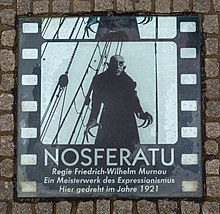This article needs additional citations for verification. (May 2017) |
You can help expand this article with text translated from the corresponding article in German. (July 2013) Click [show] for important translation instructions.
|
Albin Grau (December 22, 1884 in Leipzig-Schönefeld – March 27, 1971) was a German artist, architect and occultist, and the producer and production designer for F.W. Murnau's Nosferatu (1922). He was largely responsible for the look and spirit of the film, including the sets, costumes, storyboards and promotional materials.

A lifelong student of the occult and member of Fraternitas Saturni, under the magical name of Master Pacitius, Grau was able to imbue Nosferatu with hermetic and mystical undertones.[1] One example in particular was the cryptic contract that Count Orlok and Knock exchanged, which was filled in Enochian, hermetic and alchemical symbols. Grau was also a strong influence on Orlok's verminous and emaciated look. Grau claimed to had originally gotten the idea of shooting a vampire film while serving in the German Army during World War I, when a Serbian farmer told him that his father was a vampire and one of the Undead, though this story may have been fabricated to promote the film.[2]
Before Grau and Murnau collaborated on Nosferatu, which was shot in 1921, Grau was planning to create several movies devoted to the occult and supernatural through his studio, Prana Film. Since Nosferatu was a loose and unauthorized translation of Bram Stoker's Dracula Prana had to declare bankruptcy in order to evade infringement lawsuits. This made Nosferatu its one and only release.
- ^ Tobias Churton. The Beast in Berlin: Art, Sex and Magick in the Weimar Republic. Rochester, VT: Inner Traditions,2014, p. 68
- ^ Eisner, Lotte (1973). Murnau. London: Secker & Warburg. pp. 108–109. ISBN 9780436097003.